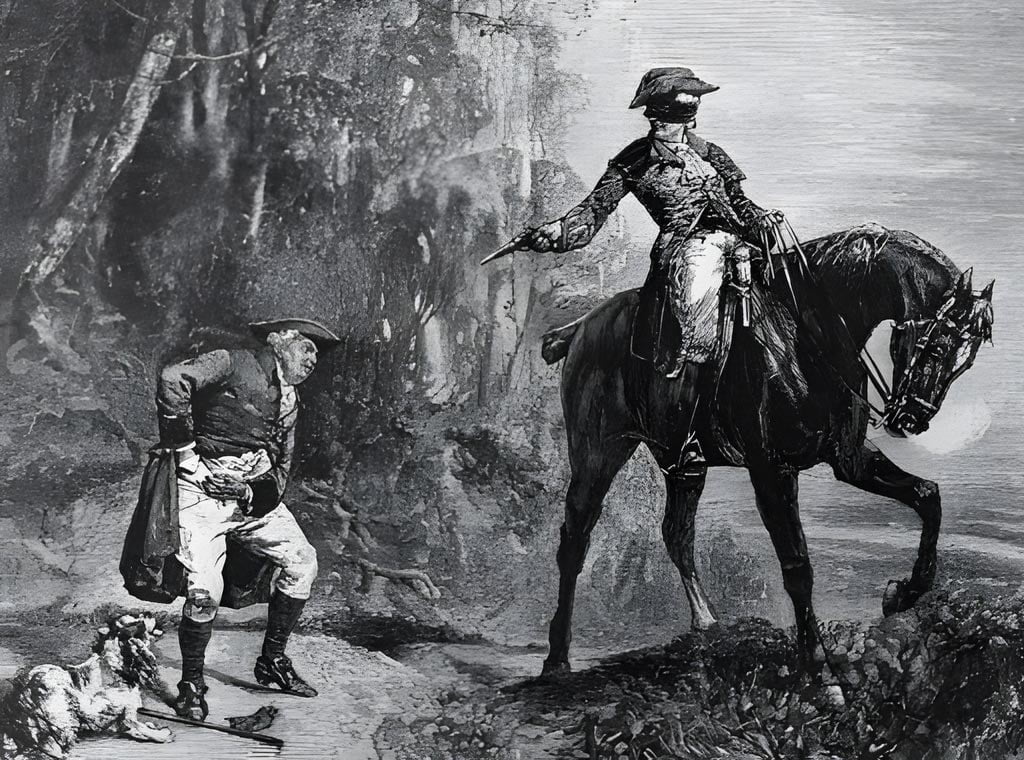The Highwayman of New Ross
They say “visiting the past, is like visiting another country” and this could especially be said of Irish history in the 1700s. During this time Ireland was a wild and dangerous place to live, especially outside the protection of Dublin!
But nowhere in the country was more dangerous than Wexford. Rebel forces hiding in the hills, Highwaymen on every road and the coastline was said by the London Times to be “infested with pirates” so you have to be pretty special to stand out. James Freney was just that.
Freneys ancestors were Norman, and once had lots of lands and their own castle, however, when the dreaded Oliver Cromwell arrived here, he seized the estates and castles from the Normans and installed his own loyal men. Freneys family lost everything, lands, titles and money. And now, less than 100 years after Cromwells arrival, the Freneys worked as Stewards on Lord Robbins Estate. Set in the lush green countryside near the village of Inistioge. An exceptionally pretty village it looks little different from what it would have looked like in Freneys time. Indeed, it is for this reason, it has been used as a film set for a number of Period Films over the years.
To be fair to the Robbins family though, to all accounts, they seemed to be very good and kind people. Mrs Robbins even paid for young James and his siblings to be educated and would be guaranteed employment and comfortable housing on the estate when they came of age.

James was a natural horseman, and so despite his education, a future as a groom looked likely. It was probably for the best as sadly James, most certainly wasn’t an academic.
He won every steeplechase and horse race in the South East, making new friends among the sons of the landed gentry. These young chaps, secure in knowledge they would never need to work thanks to the large estates that funded their affluent lifestyles took James on as a type of mascot and soon he was spending all his free time with them, hanging out in bars and inns, gambling on cockfights, hurling and playing cards and impromptu horse races of which James never lost.
Things began to change for James when he fell in love. Ann worked as a maid for the Robbins Family. Pretty, vivacious and more than able for the cocky young James, the fell head over heels for each other and were married within months.
Together they set up a pub and grocery in Waterford but less than a year later their dream came to an end. Not being a “Freeman” James was subject to extra Taxes, which he refused to pay. Their premises were blacklisted, and having no customers their savings and money they had borrowed to start their business soon ran out and they were forced to close. Ann, pregnant with their first child returned home to her parents and James began working as a Groom back at the Robbins Estate and began to slowly pay off their debts.
So life was not looking good for James, the debts he owed were large, he owed money everywhere. His old friends had deserted him and he was growing more resentful and angry by the day.
One fortuitous night however, he found himself in an Inn in Thomastown, supping an Ale with the notorious Kilkenny Highwayman John Reddy. He told him he owed £50 to various creditors, a huge sum in those days.
John Reddy invited James to join him and his mates that night, See if he could “earn it” so to speak. On his first raid, earned himself the grand sum of £50, James had found his calling!
Over the following months he became more and more confident, earning the nickname of Captain Freney and becoming the unofficial leader of the gang.
Life was finally on the up for James, he kept the day job though. The story goes that Lord Robbins would often host card games in the house, inviting other landlords and gentlemen of means living in the area. James would be there to stable their horses, making a quiet note of who was present and then race off to rob their houses. He would be back in plenty of time to have the horses ready for their return journey home, where he would casually enquire who had won the pot that night? Then giving the winner a small head start he would race ahead of them and they would soon lose their nights winnings to a demand of “Stand and Deliver”
Creating his own territory that stretched deep into Wexford, as far along the N30 Highway to Clonroche, the locals still call it the “Travellers Lament” to this day.
He robbed Stage Coaches, travellers on horseback heading to the busy port of New Ross, coming from Wexford, Kilkenny and Waterford it was rich pickings.
The gang also made a fortune breaking into some of the Big Houses of the area, there are great stories of the cockiness and wit displayed during the robberies of which a number still stand, as luxury hotels today.
But what set James apart, was his reputation as always acting as a gentleman during his raids and robberies. Always charming, chivalrous with good manners and he never robbed from those who couldn’t afford it. There are many stories of him leaving coins on the window sills of poor families or those on the verge of eviction. And many more of the close calls, where he was almost caught, local people hiding him in the most ingenious of ways, he was once hidden in a coffin, his face dusted with flour and the women of the house clustered about him wailing in sorrow at their lost “father”!
For five long years life continued in this way, his identity remaining a secret to the authorities until 1748. Some of his lesser accomplices had been caught and sentenced to hang. Hoping to cut a deal, they gave up the name of the New Ross Highwayman.
James was declared and Outlaw, guilty of High Treason for which the penalty was death.
Now under threat of being betrayed by someone for the £100 reward being offered for his capture, he was forced to leave his beloved Ann, their children and head for England.
James had only ever spent what he needed, giving much of his ill-gotten gains away to the poorer locals, what wasn’t spent of given as charity, he hid. In the old stone walls, in rotten tree trunks, in the bottom of wells. And so under cover of darkness he collected as much as he could before he left for Cork on horseback. Here pawned everything, then under an assumed name he managed to get passage on board a ship headed for Bristol.
Upon reaching Bristol, and using the money he had left, he set himself up as a shopkeeper and sent for Ann and the children.
In the meantime, his old employer Sir Robbins along with a handful of other influential friends James had gathered over the years worked hard, on his behalf to cut a deal with the Authorities
ames bargained his own freedom by by giving the names of the remaining members of his gang before they had a chance to do the same. In August 1749, at the Kilkenny Assizes, seven of them were found guilty and hanged. Three others were hanged the following year.
He understandably laid low a little longer before discreetly moving back to New Ross, where he was given a job working as a customs official for the Revenue. I suppose the logic being, it takes a thief to catch a thief.
It wasn’t long before word got out the Robber Freney had returned home and he found himself the toast of many, they came from far and wide to buy him a drink and hear his stories. His kindness to the poor had not been forgotten. His tales were even published and used in the local hedge schools to teach the children how to read!
He never returned to the Highway, he and Ann lived quietly in a simple house on Quay Street in New Ross, now the home to an artisan cafe called The Cracked Teapot. Coincidently the owner of the Cafes ancestors also worked the Robbins Estate.
James died in December 1788 an old man, who’d lived a life most extraordinary and was buried in a simple unmarked grave in Inistioge.
If you would like to hear more about James Freneys exploits and visit some of the places he frequented, including the driving the Travellers Lament then check out the Hook and Snare Tour!

